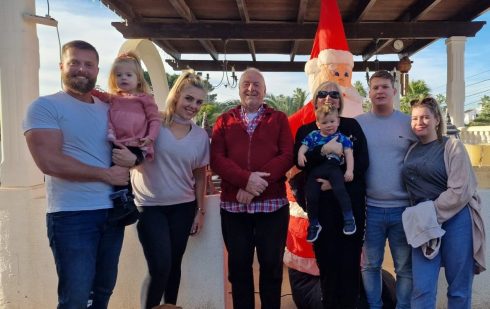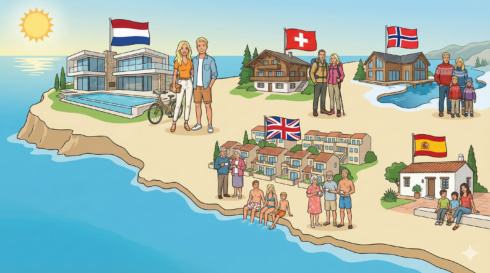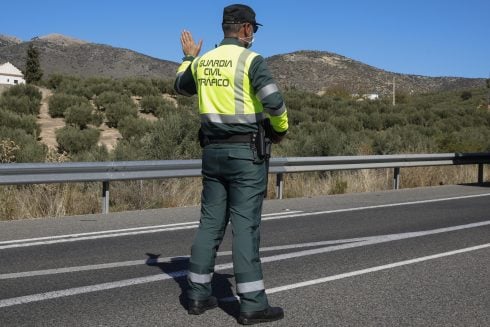BRITISH expat Patrick Clancy went into hospital for a routine shoulder operation and left six weeks later after a near-death brush with a controversial drug that left him unable to walk or eat.
Six years later, the 80-year-old still feels the mental and physical damage he suffered at the hands of the lethal drug, that he should never have been given.
The notorious painkiller Nolotil, is known to decrease the white blood cell count of Northern Europeans to dangerous levels, leaving them vulnerable to infections and sepsis.
While the medicine is a common painkiller in Spain, regulations were put in place banning the sale of the drug to Brits without a prescription, in 2018.
For Clancy that date sadly came too late.
It was a year earlier on September 25, 2017, that the retired oil worker, from Surrey, was admitted to Hospital de Dénia-Marina for a routine shoulder replacement and then given Nolotil to ease the pain.
It seemed fine at first but after four days he started to feel ‘extremely unwell’ and was suffering from infections, cold sweats, fevers and fits.
Then 74, he was immediately admitted to intensive care and plunged into an induced coma, which he wouldn’t wake up from for six weeks.

He was put on dialysis due to kidney failure and diagnosed with septic shock after doctors discovered his body was fighting three infections at once.
Medical staff urged Patrick’s wife, Julie, to inform family in the UK to come immediately, knowing that if the infections reached his shoulder, the father of four’s days would be numbered.
“They didn’t think I’d last the weekend. It was absolutely awful for my family”, the granddad told The Olive Press.
“It was terrible because every single day it was like rolling the dice. It went on for six weeks and so obviously my family had to go back to England, not knowing if it was the last time they’d see me.”
The experience was particularly traumatic for Julie, who visited her husband of 34 years every day, as doctors mistakenly informed her that Patrick’s leg had been amputated and on another occasion, medical staff moved her husband without telling her, leading her to believe he had died.

Patrick, who had lived in Alicante for over 20 years, was in a coma for an alarming 39 days before doctors managed to revive him.
After recovering in hospital for two weeks, the Javea resident was sent to Fontilles, a former leper colony in the mountains of Alicante, to recover.
There, the expat spent six weeks relearning how to walk, sit up and eat again before being discharged just in time for Christmas. However, the experience left Patrick ‘emotionless’.
He said: “Instead of being excited to come home on the day she came to pick me up to take me home for Christmas I just thought, ‘Oh, nothings changed’.
“It was a shock to the system. If a bomb had dropped down beside me, I would’ve thought; ‘Look at that, it didn’t go off’.
In fact, Patrick couldn’t even talk about the experience until three years later.
Now, six years on, he tells The Olive Press he still experiences mental and physical side effects as a result of Nolotil.
“A doctor told me Nolotil is like a nuclear bomb going off in the body. Everytime I go to the hospital they say I’m alright, but I’m just not the same person anymore. It’s a very, very heavy burden.”
Patrick suffers a constant ‘pins and needles’ sensation in his extremities, random stabbing pains and frequent flu-like symptoms.
He also experiences consistent brain fog and extreme tiredness. He said: “I always want to put my head in a bucket of cold water. I’m not half as sharp as I used to be.”
But the worst of it, he says, is remembering the terrifyingly vivid nightmares he had while under treatment.
He recalls: “I’m a very nuts and bolts person. Not very emotional. But when I talk about the nightmares I burst into tears, I cry my eyes out. Every single one scared me to death.”
“After only taking a few tablets over four days, I was in serious trouble. I was very fortunate because I am a strong person. I often think, thank goodness I stopped taking them because I might not have survived otherwise.”
In the years following his experience, Patrick says doctors have suggested his case could have in-part inspired the 2018 regulations.
He said: “It’s good but I feel cheated by the fact that all they’ve done is create an advisory and not a statute.”
“From my point of view, the question is what is a life worth? The problem is that it is a very good painkiller and it must be cheap because they dish them out like smarties.”
“Something needs to be done because people are still being affected. Others will suffer because they are turning a blind eye.”

Now, Cristina Garcia del Campo, an activist who has been fighting for greater restrictions on the drug, has launched a lawsuit against the Spanish Ministry of Health due to their inaction over Nolotil. She urges those concerned to support the Asociación De Afectados Por Fármacos (Association for Those Affected by Pharmaceuticals) or donate to their Go Fund Me.
READ MORE:
- EXCLUSIVE: ‘Deadly’ painkiller Nolotil is STILL being given to Brits in Spain despite restrictions being brought in five years ago
- Lethal painkiller Nolotil BANNED for Brits visiting Spain
- Manufacturers of ‘lethal’ drug Nolotil face €500 million lawsuit
Click here to read more Must Read News from The Olive Press.








